| Separate is never equal : Sylvia Mendez & her family's fight for desegregation Author: Tonatiuh, Duncan | ||
| Price: $23.98 | ||
Summary:
Years before the landmark U.S. Supreme Court ruling Brown v. Board of Education, Sylvia Mendez, an eight-year-old girl of Mexican and Puerto Rican heritage, played an instrumental role in Mendez v. Westminster, the landmark desegregation case of 1946 in California.
| Accelerated Reader Information: Interest Level: LG Reading Level: 5.10 Points: .5 Quiz: 164558 | Reading Counts Information: Interest Level: K-2 Reading Level: 4.60 Points: 2.0 Quiz: 63114 | |
Awards:
Robert F. Sibert Informational Book Honor, 2015
Common Core Standards
Grade 1 → Reading → RI Informational Text → 1.RI Key Ideas & Details
Grade 1 → Reading → RI Informational Text → 1.RI Range of Reading & Level of Text Complexity
Grade 2 → Reading → RI Informational Text → 2.RI Key Ideas & Details
Grade 2 → Reading → RI Informational Text → 2.RI Range of Reading & Level of Text Complexity
Reviews:
Kirkus Reviews (+) (05/15/14)
School Library Journal (02/01/17)
Booklist (05/01/14)
The Bulletin of the Center for Children's Books (07/14)
The Hornbook (00/07/14)
Full Text Reviews:
Booklist - 05/01/2014 Pura Belpré Award–winning Tonatiuh (Pancho Rabbit and the Coyote, 2013) makes excellent use of picture-book storytelling to bring attention to the 1947 California ruling against public-school segregation. The concise, informative text, with occasional and always translated Spanish lines, discusses how being banned from enrolling in an Orange County grade school because of her skin tone and Mexican surname inspired Sylvia Mendez’ family to fight for integrated schools. Soon they were joined by many others, including the NAACP and the Japanese American Citizens League, which led to their hard-won victory. Tonatiuh’s multimedia artwork showcases period detail, such as the children’s clothing and the differences between the school facilities, in his unique folk art style. An endnote essay recapping the events, photos of Sylvia and her schools, and a glossary and resource list for further research complete this thorough exploration of an event that is rarely taught. This would be a useful complement to other books about the fight for desegregation, such as Deborah Wiles’ Freedom Summer (2001) or Andrea Davis Pinkney’s Sit-In (2010). - Copyright 2014 Booklist.
School Library Journal - 05/01/2014 Gr 2–5—When the Mendezes moved to Westminster, CA, in 1944, third-grader Sylvia tried to enter Westminster School. However, the family was repeatedly told, "'Your children have to go to the Mexican school.' 'But why?' asked Mr. Mendez……'That is how it is done.'" In response, they formed the Parents' Association of Mexican-American Children, distributed petitions, and eventually filed a successful lawsuit that was supported by organizations ranging from the Japanese American Citizens League to the American Jewish Congress. Younger children will be outraged by the injustice of the Mendez family story but pleased by its successful resolution. Older children will understand the importance of the 1947 ruling that desegregated California schools, paving the way for Brown v. Board of Education seven years later. Back matter includes a detailed author's note and photographs. The excellent bibliography cites primary sources, including court transcripts and the author's interview with Sylvia Mendez, who did attend Westminster School and grew up to earn the Presidential Medal of Freedom. Tonatiuh's illustrations tell a modern story with figures reminiscent of the pictorial writing of the Mixtec, an indigenous people from Mexico. Here, the author deliberately connects his heritage with the prejudices of mid-20th century America. One jarring illustration of three brown children barred from a pool filled with lighter-skinned children behind a sign that reads, "No Dogs or Mexicans Allowed," will remind readers of photographs from the Jim Crow South. Compare and contrast young Sylvia Mendez's experience with Robert Coles's The Story of Ruby Bridges (Scholastic, 1995) to broaden a discussion of school desegregation.—Toby Rajput, National Louis University, Skokie, IL - Copyright 2014 Publishers Weekly, Library Journal and/or School Library Journal used with permission.
Bulletin for the Center... - 07/01/2014 Before Brown v. Board first brought in the heavy equipment to level the national educational field, important court battles were being fought-and won-at local levels. Among the most notable, and later overlooked, cases involved the Mexican-American Gonzalo Mendez family in California, whose dark-skinned children were assigned to a substandard “Mexican” public school, while their fairer-skinned cousins were invited to attend the “white” school. Mendez attempted to rally parents whose children were likewise shut out of the better public school, but found many too afraid of economic reprisal to raise a protest. Finally, Mendez found an attorney, and the school case went to court. There, testimony from the school superintendent demonstrated the depth of bigotry against the Mexican Americans, but a final ruling stated that “public education must be open to all children by unified school association regardless of lineage.” Tonatiuh frames the story through the experience of the Mendez daughter, Sylvia, whose first day at the integrated school is far from a social success. When her mother reminds her of what they had been through to get her into a good school, the story proceeds through a flashback, culminating in a better second day and a promising school year for Sylvia. Tonatiuh’s cast, stylized with subtle motifs that echo indigenous Central American artwork, replays the legal battle with dignified formality. An author’s note provides adult readers with additional material to share on the Mendez family in the aftermath of the trial, in addition to a glossary, index, bibliography, and photographs. This will rightfully be a first choice for juvenile collections on civil rights. EB - Copyright 2014 The Board of Trustees of the University of Illinois.
School Library Journal - 02/01/2017 ETHICAL RESPONSIBILITY; SOCIAL AWARENESS - Copyright 2017 Publishers Weekly, Library Journal and/or School Library Journal used with permission.



